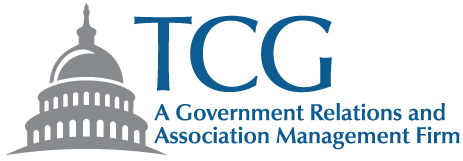TCORS Capitol Group, LLC’s President and principal owner Alan J. Deckman has been featured in the The Alliance for Nonprofit Growth & Opportunity (TANGO) Partners Perspective with his article “How the Blockchain is a Boon to Nonprofits.”In the piece Mr. Deckman enumerates some of the ways that the blockchain offers an ever-evolving opportunity for nonprofits to adapt to new models for growth. Click here link to read “How the Blockchain is a Boon to Nonprofits,” or see the full text below.
TCORS Capitol Group, LLC. (TCG) is pleased to serve as a TANGO partner. The Alliance for Nonprofit Growth and Opportunity (TANGO) creates partnerships between nonprofit and for-profit organizations to drive innovation, create cost savings, and deliver mission advancement. TANGO, now over 1,400 members strong, brings a wealth of professional knowledge, networking and services to help nonprofit organizations and communities thrive. For more information about joining as a partner or nonprofit, visit: www.tangoalliance.org
How the Blockchain is a Boon to the Future of Nonprofits
Alan Deckman, President TCORS Capitol Group, LLC (TCG)
Blockchain technology is poised to profoundly reshape the professional for- and non-profit spheres, from day-to-day transactions, to relationships, to essential structures and functions. A blockchain is a transparent database of information stored across a vast, traceable digital network that verifies and concretizes each financial exchange. Although best recognized in the context of cryptocurrencies like Bitcoin, Ethereum, and Dogecoin, blockchain offers an ever-evolving opportunity for nonprofits to adapt to new models for growth. Here are three fundamental ways nonprofits stand to benefit from integrating the resources of this rapidly expanding economic frontier.
1) Trust in Transparency
The cornerstone of a nonprofit is trust: trust in an organization’s ability to provide services, skills, and support to its community, and trust in its efficient and direct use of funds. A nonprofit’s durability is made possible as the result of financial support in the form of grants from philanthropic organizations, individual donations, etc… Nonprofits can increase their impact and solidify donor retention by offering an accessible, visible channel through which participants can feel secure in the giving and application of their funds. Blockchain provides this channel. Methods such as “smart contracts” assure donors that cash is allocated as intended, released to an organization only when certain criteria are met and accounted for on the blockchain. These blockchain-recorded transactions also instantly report results, reinforcing their credibility. Blockchain removes the barriers of a traditional donation ecosystem, allowing both donor and recipient to see where the money goes. (As an additional benefit, as stated by the Council of Nonprofits and the IRS, donating cryptocurrency is a nontaxable event because it is considered property. Therefore, donors do not currently have to recognize capital gains, and may itemize deductions against the fair market value of the donated assets.) In short, all parties benefit from the real-time transparency of transactions from donor to nonprofit institution.
2) Eliminating Third Party Transactions
While the Blockchain establishes absolute transparency in the donation process, revealing the direct pipeline between financial donor and recipient, it also eliminates the middleman. The blockchain provides greater ability to impact the cause that the donor supports, because a greater percentage of the intended gift goes directly to the nonprofit, and in turn, directly toward fulfilling its mission. Traditional financial institutions have to take a slice of the pie, in the form of fees. (Though this predicament has inspired the development of organizations like Every.org, a nonprofit donation platform that does not charge fees.) The use of Blockchain will show better results for the organizations that adopt blockchain sooner, relative to their peers who rely on the for-profit traditional financial ecosystem, where each intermediary takes a percentage of the donors’ intent and uses it in their for-profit endeavor. The question donors look for in a high-quality nonprofit is what percentage of its revenue goes to the cause that it supports. The Blockchain had the potential to revolutionize the fundraising process, by eliminating the inevitable complications and expenses of the involvement of a third party.
3) The Future of Philanthropy
Blockchain provides a level of surety between grant-giving foundations and institutions and nonprofits. With the availability of this technology, in the future, foundations may require more rigor that indicates how their dollars are being put to use. Similarly, philanthropists have begun to embrace blockchain as a means to impact the cause they support. Tech-savvy entrepreneurs require an increase in modern solutions to observe traceability in their businesses and philanthropic endeavors. Blockchain offers a key to these solutions. With the advent of significant philanthropic movements, such as The Giving Pledge, a new level of transparency will be required to account for the movement of such major funds. Blockchain offers an exceedingly efficient, direct, transparent, and traceable channel through which philanthropic funds can be allocated. The foundations and philanthropists of the future will likely require contemporary, sophisticated technologies to manage the donations of the future, facilitated by the use of blockchain.
Further Reading and Resources
Connecticut Blockchain Association
The Council of Nonprofits “What Your Nonprofit Needs to Know About Cryptocurrency Donations”
One37PM “The Role of Blockchain and NFTs in Nonprofit Fundraising”
ITTransition “Blockchain for Nonprofits: Making Our World a Better Place”
The Chronicle of Philanthropy “Cryptocurrency and Nonprofits”
Internal Revenue Service “Frequently Asked Questions on Virtual Currency Transactions”
Alan J. Deckman is the Founder and President of the Connecticut Blockchain Association, whose mission it is to develop, promote, and advance blockchain technology and to establish Connecticut as a leader for blockchain innovation. The Connecticut Blockchain Association strives to create a unifying advocacy voice for the Blockchain industry in the state of Connecticut. Mr. Deckman is also the President and principal owner of TCORS Capitol Group, LLC. (TCG), a full-service government relations and association management firm that has provided the highest quality of expertise and knowledge in the areas of lobbying and association management for more than 25 years.


